Friday, 26 June 2015
Distance 23 km
Duration 4 hours 50 minutes
Ascent 102 m, descent 103 m
Map 129 of the TOP100 lime-green series
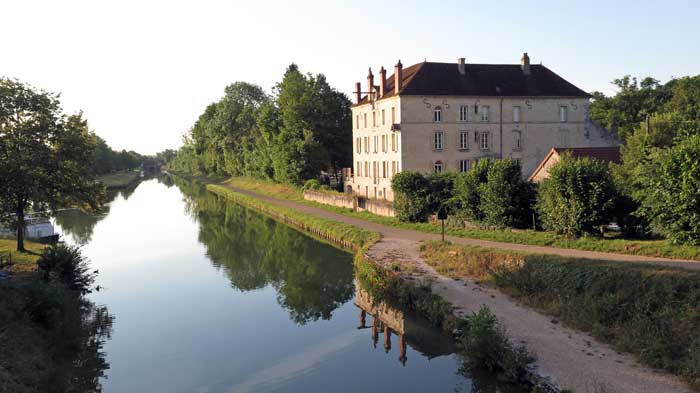
Amidst yesterday’s dismay at finding both the camping ground and the hotel closed, we had forgotten to ask what time the village bar opened in the morning, so just in case, I made sandwiches of the remaining bread, mayonnaise, lettuce and tomato. They would be better than nothing if we found the bar closed.
We started off unfed at 7 am. The old mill building regarded itself calmly in the canal as we crossed the bridge and walked up to town, and when we arrived at the bar it was open, so we got pastries at the boulangerie next door and settled down happily on the terrace with our coffee.
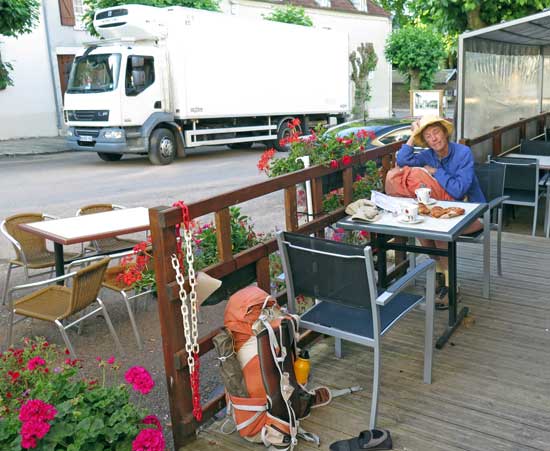
At the bottom of this street was the famous château, whose white walls could be glimpsed through the trees.
It had started life as a fortress, complete with moat, drawbridge and defensive walls, and had been partly destroyed in the fifteenth century, then rebuilt in the sixteenth in the new Renaissance style. Its opulent grounds stretched down to the river, and we had seen a fine entrance avenue on our several trips to and fro on the D905.
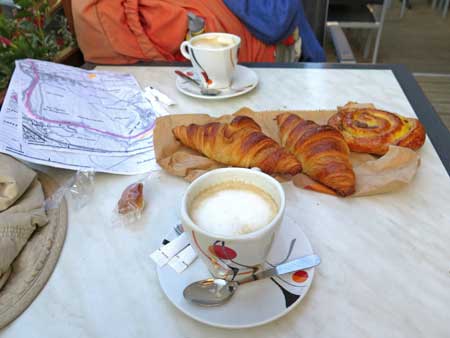
However, looking down the avenue was as much tourism as we were willing to do, and anyway, the château would not have been open at this hour.
Meanwhile the croissants and the coffee were excellent, and I had a second cup as I waited for Keith to finish his first.
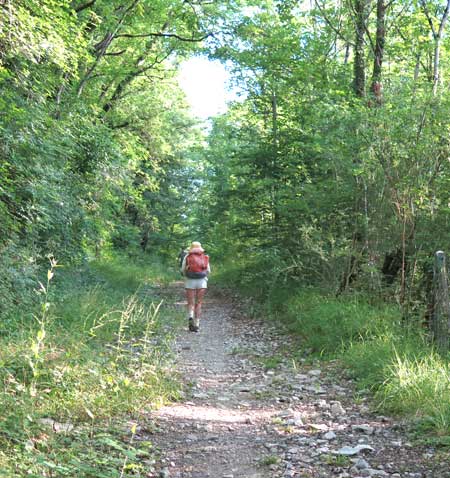
Well fed and very pleased with ourselves, we continued along the Grande Rue, then turned off up the escarpment. Our plan was to climb over a ridge instead of following the canal, thus avoiding a couple of extravagant loops, and doing in 5 km what the canal took 15 km to do.
The only steep part was the first stony climb to the plateau, and as we toiled up through the trees we met a young fellow in braces swinging down with great carefree strides, like a farm lad from an earlier age.
Here we took the opportunity to toss the soggy mayonnaise sandwiches into the bushes.
At the top there was a road and the land suddenly levelled out. We strolled along through wheatfields and woods, then descended to the village of Ancy-le-Libre in the valley.

It was much smaller than Ancy-le-Franc, but looked prosperous, with several new or renovated houses amongst the old. The church was a fine sight with its soot-black belltower, but needless to say there were no shops.
We made for the canal and were about to cross the bridge onto the towpath when Keith looked over his shoulder and saw some workmen emerging from a little café (Chez Mémé).
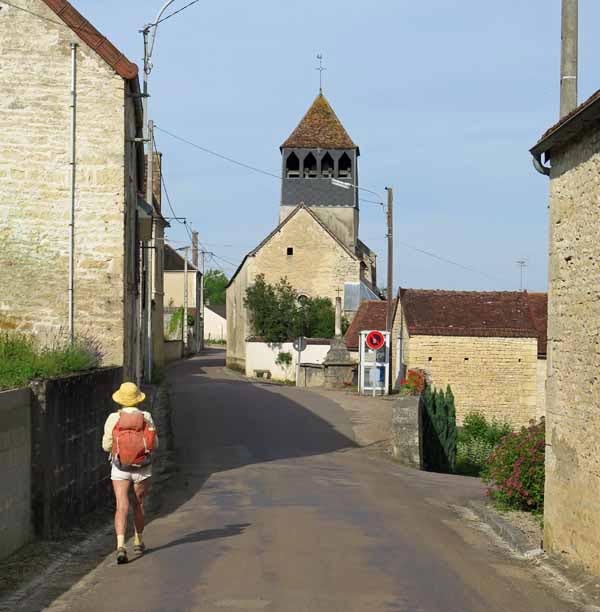
It had only been an hour and a half since breakfast, but we were happy to pay it a visit.
The white-washed terrace was full of flowers, notably a glorious red rose against the wall. Nearby, between the café and the canal, some enterprising soul had made a long vegetable patch, and he was irrigating it by dipping his watering can into the canal.
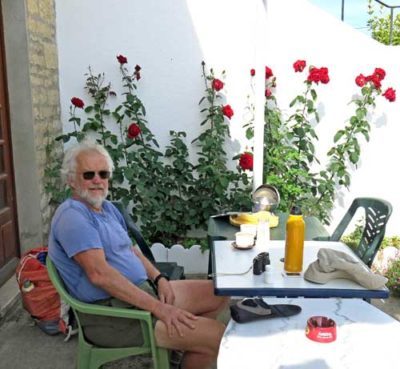
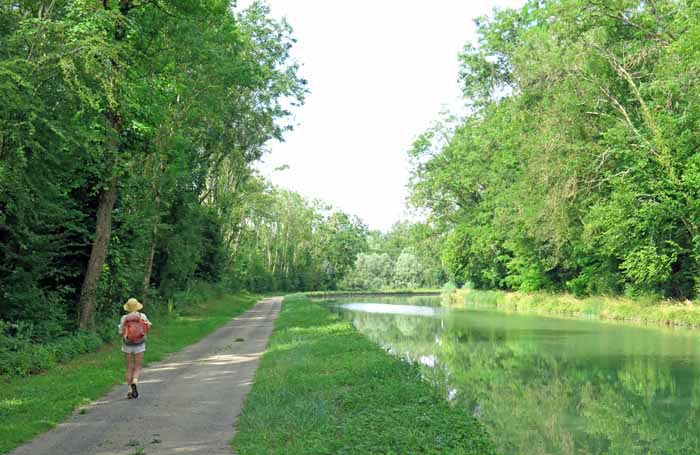
When we finished our coffee, we set off along the towpath, ignoring a possible bar at Argentay, and after another hour and a half we saw the high bridge of Tanlay at the end of a long straight stretch.
The morning had become hot and we were ready for another break.
We hoped to find a bar near the château of Tanlay, but as soon as we crossed the bridge we saw one next to the boat harbour, looking very new and smart, all blonde wood and windows.
Chairs and tables were set out on white gravel in the shade of an ash tree.
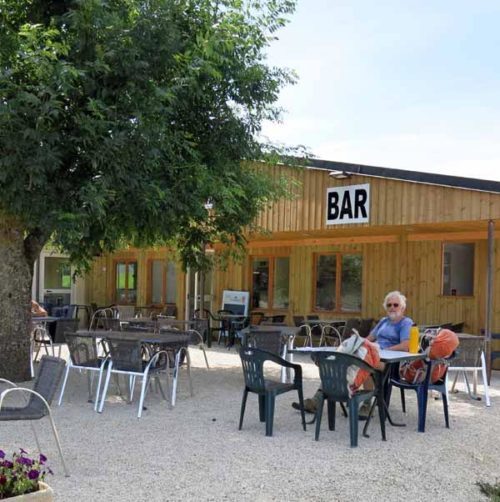
We drank a lot of iced water and then a small coffee, just because we could. There were people from the boats sitting nearby, and some cyclists. Everyone seemed to be a tourist of some kind.
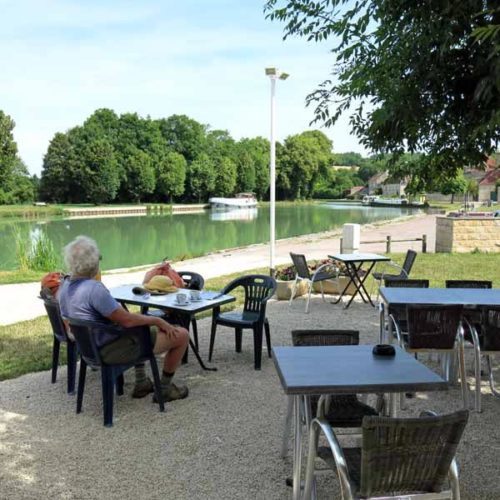
A hugely fat American man wobbled past on a bicycle, calling out to his friend “I sure hope I don’t miss any more meals!” For the sake of his bicycle, we hoped he would.
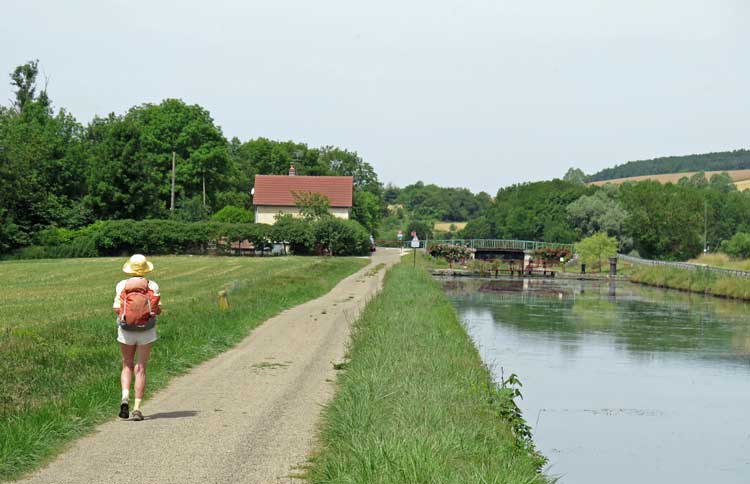
The rest of the day’s walk was pleasant but uneventful, and after eight or nine more kilometres on the towpath we saw, across a little stream, the camping ground of Tonnerre.
The town itself was nowhere to be seen – it was further on.
We entered via a footbridge, paid our €13.70 and flung ourselves down gratefully in the long grass. It was tussocky and dotted with molehills, but we did not mind.
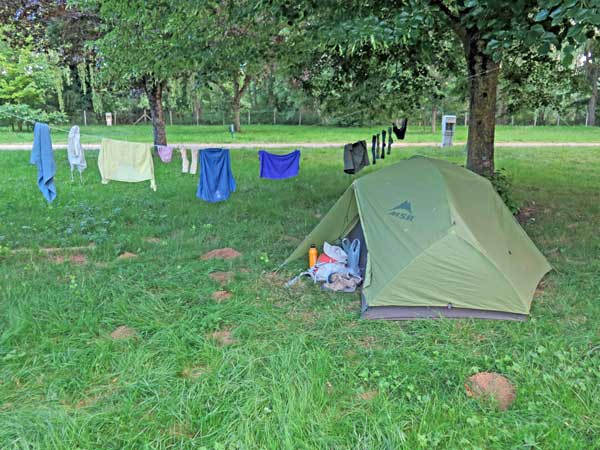
We were surprisingly tired for such an easy day, and I had an extra worry – my arm that had been so painful and sensitive when I had shingles last year, had begun to hurt again, in the same way.
I was terrified that I was getting a second dose of the hateful thing, so I covered it in a mass of sticking plaster to protect it from brushing against anything, and tried not to think about it.
At about 6 pm we ventured out to see the sights. It was roasting hot and the declining sun shone full in our faces until we got to the main road and turned towards the centre of Tonnerre.
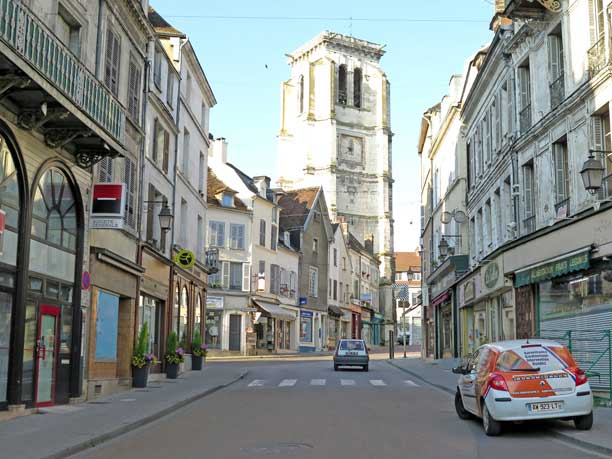
Scuttling from one patch of shade to the next, we crossed two strands of the Armançon, went under the railway line and finally arrived at some shops.
Just after the third river crossing was a square with a formal garden set back from the road, and beside it the broad, handsome flank of the Hôtel Dieu with its lancet windows and steep, red-tiled roof.
Further up the street we could see the squat belfry of the church of Notre Dame, and we walked up towards it in search of an autobank, as we were short of cash.
We found several of them in a row, but it was a different story when we started looking for a bar. There were some, but they were inexplicably closed, and even restaurants were hard to find.
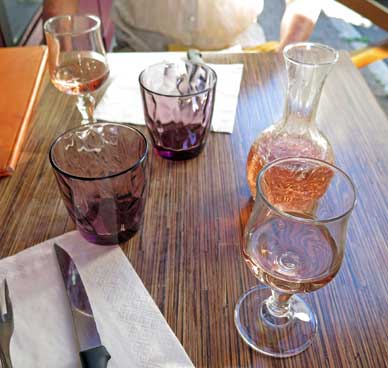
However, we were not in Vitteaux any more, and we eventually found two – a pizza-grill sort of place and the Hôtel du Centre, opposite the Hôtel Dieu. Eventually we decided on the hotel, as it had a special €15 menu on Fridays, and we liked the look of its little wooden deck protruding into the side street.
When it opened at 7 pm we went in and took a table on the deck, in the shade of an awning. For the first hour we sipped glasses of rosé very slowly, resisting all attempts by the waitress to persuade us to order our meal. We had a change of plan to discuss.
Our idea had been to go to Ligny-le-Châtel tomorrow, and then to Auxerre the following day. But Keith was worried that Ligny, which was about the same size as Vitteaux and off the canal, might be similarly lacking in amenities.
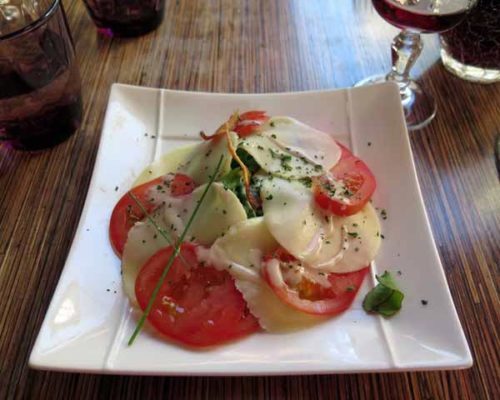
He suggested that we go instead to Chablis, a tourist town with guaranteed comforts, and Auxerre the day after, following the GR654. We had no maps for this, but it sounded like a good idea.
Meanwhile more diners had trickled in and the terrace had filled up, while the interior remained empty, as the evening was very warm. We had finished our drinks by then so we turned our attention to eating.

Keith’s first course was a classic tomato-mozarella-basil salad, and I had a plate from the cold buffet which was laid out inside.
The plates were small but I managed to balance a mountain of good things on mine – mushrooms, hard-boiled eggs, beetroot, tomato and other fresh, colourful salad vegetables.
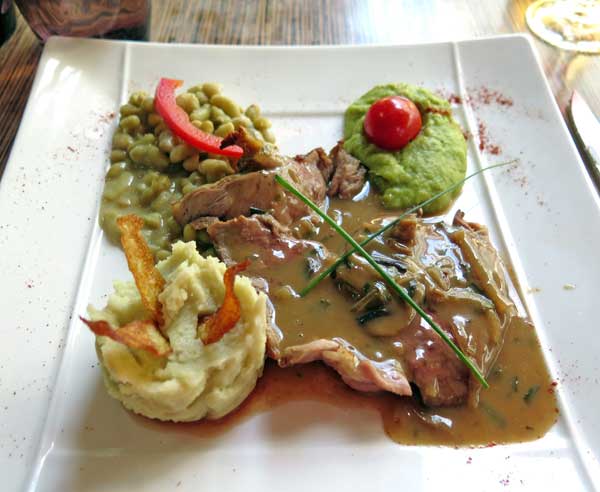
For the main course we both had lamb, with beautifully cooked accompaniments and two long chives making the sign of the cross over the dish.
To finish, Keith had a crème caramel and I had cheese, which I enclosed in pieces of bread and put away for the morrow.
At about 9 pm, just as we were leaving, a party of eight rowdy locals arrived, to the disgust of the waitresses, but eventually they were allowed to come in.
We left them to it and strolled back in the mild evening air to our little home on the canal.
The rest of our walk along this canal took place in 2018, three years later.
Previous day: Montbard to Ancy-le-Franc